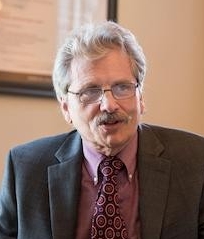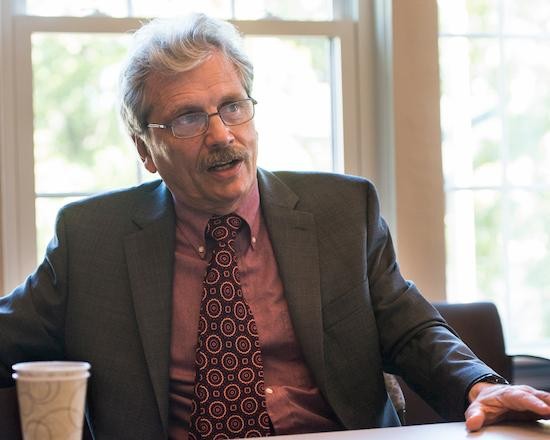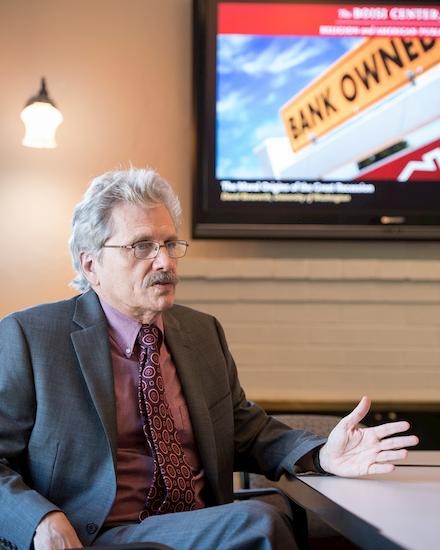The Moral Origins of the Great Recession

David Bosworth
University of Washington
Date: September 23, 2014
Abstract
Although the financial collapse of 2008 moved with alarming speed, the evolution of the bad faith that drove the recession is a more gradual story. Over the past sixty years, sweeping ethical, political and economic change has created a new "virtual America," driven by the commercialization of both public spaces and electronic information. Ultimately the materialist values of this new America have co-opted our politics, health care, art and even the most intimate aspects of our personal lives. Drawing on his latest book, The Demise of Virtue in Virtual America: The Moral Origins of the Great Recession, David Bosworth will present an alternative story of American life since 1950 that relentlessly challenges today’s dominant narratives.
Speaker Bio

David Bosworth is a professor in the University of Washington’s Creative Writing Program, where he previously served as director for five years. He is the author of The Demise of Virtue in Virtual America: The Moral Origins of the Great Recession (2014). He also wrote the award-winning novel From My Father, Singing (1986) and the short fiction collection The Death of Descartes (1981). His fiction, poetry, and literary and cultural essays have been published in numerous journals, such as The Public Interest and The Georgia Review. Bosworth has also contributed to a number of collective projects on cultural change in America, working with the Institute for American Values and other organizations to address issues like the fragility of the American family and the corporatization of public education. He is currently working on a book about epistemological change, scheduled for publication in 2015. He earned his B.A. from Brown University.
Event Photos

David Bosworth speaking at the Boisi Center about his new book, "The Demise of Virtue in Virtual America: The Moral Origins of the Great Recession."


Photos by MTS photography
Event Recap
On September 23, David Bosworth visited the Boisi Center to discuss his new book The Demise of Virtue in Virtual America: The Moral Origins of the Great Recession. Bosworth, a professor in the University of Washington’s Creative Writing Program, explained that he wrote the book in an attempt to unearth the moral and cultural changes that were at the root of the housing market bubble and collapse, and the ensuing recession.
Noting that people frequently act contrary to their professed ideals, Bosworth blamed the fact that traditional ideals no longer aptly apply to the changing social situation. He hoped that his book could help people recognize this disjunction and thus realign ideals and realities.
Bosworth pointed to many changes that have occurred since the 1950s, and tried identifying those factors responsible for these changes. Consumerism was a big theme throughout—both in shaping the tastes and lives of consumers, as well as the private lives of employees. Bosworth sees “evangelical mammonism”—the spirit of radical capitalism of our era, which seeks to spread the “good news” of material consumption—as replacing the republican and Judeo-Christian roots of our country, to our great detriment.
When children were raised in the 1950s, time and play were unstructured. Now, the structure of the work place has seeped into private life: children’s lives are scheduled, and their play highly organized. Fifty years ago, there were public spaces—parks, the town square—that facilitated civic life. Now, the indoor mall has replaced the outdoor town square; the benches and plants bespeak this intentional transformation. Except, rather than facilitating civic life, the mall aims only to facilitate consumption.
Read More
Further Reading
Pope Benedict XVI, Caritas in Veritate, encyclical letter, July 7, 2009.
David Bollier, "News and Perspectives on the Commons," blog recommended by Bosworth.
David Bosworth, The Demise of Virtue in Virtual America: The Moral Origins of the Great Recession (Eugene, OR: Wipf & Stock, 2014)
David Bosworth, “The Spirit of Capitalism, 2000,” The Public Interest (Winter 2000).
David Bosworth, "Conscientious Thinking: Fundamentalism, Nihilism, and the Problem of Value during the Demise of the Scientific Worldview," Georgia Review 60, no. 3/4 (Fall/Winter 2006).
David Bosworth, “Auguries of Decadence: American Television in the Age of Empire,” Salmagundi (Autumn/Winter, 2006-07).
David Bosworth, “The Cultural Contradictions of Philanthrocapitalism,” Society (Autumn 2011).
David Bosworth, “From Wariness to Wishfulness: Disney’s Emasculation of Pinocchio’s Conscience,” Georgia Review (Autumn 2011).
David Bosworth, “The Pharmacy of Pain Dissuasion: America’s Addiction to Psycho-active Drugs,” Georgia Review (Spring 2014).
Dwight Furrow, ed., Moral Soundings: Readings on the Crisis of Values in Contemporary Life (Lanham, MD: Rowman & Littlefield, 2004).
Christopher Lasch, The True and Only Heaven: Progress and Its Critics (New York: Norton, 1991).
Herman Melville, “Bartleby the Scrivener: A Story of Wall Street” (SMK Books, 1853).
Herman Melville, The Confidence-Man: His Masquerade (New York: Penguin Classics, 1857).
Karl Polanyi, The Great Transformation: The Political and Economic Origins of Our Time (Boston: Beacon Press, 1944).
Jonathan Sacks, "Recovering Judeo-Christian Ethic Precedes European Recovery," ABC.net.au, December 14, 2011.
Michael Sandel, What Money Can’t Buy: The Moral Limits of Markets (New York: Farrar, Straus, and Giroux, 2012).
Wendell Berry, Home Economics: Fourteen Essays (Berkeley: Counterpoint, 1987).
In the News
There is great buzz around the release of the iPhone 6. At a Tuesday, September 23, Boisi Center lunch, David Bosworth will consider whether our enhanced devices are actually driving us apart, as he presents on his latest book, The Demise of Virtue in Virtual America: The Moral Origins of the Great Recession.

